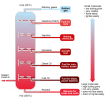RAM Patriot
Ram Guru
We should be implementing this technology in the states.
Instead of sending our recycled plastic to China.
 www.licella.com.au
www.licella.com.au
Instead of sending our recycled plastic to China.












